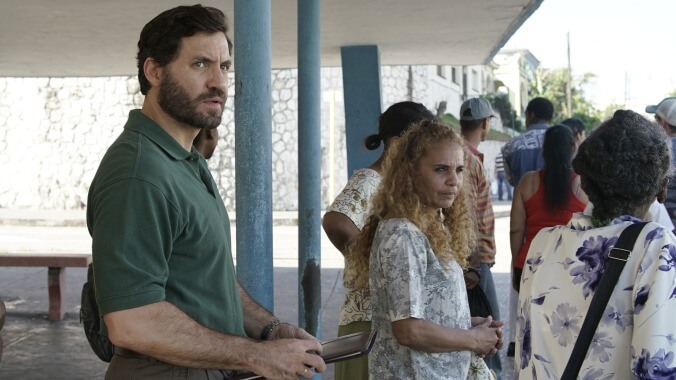From around 1990 to 1998, the Cuban government operated a deep-cover spy ring whose agents infiltrated paramilitary Cuban exile groups in Florida by posing as anti-Castro defectors. This piece of information is something of a spoiler for Olivier Assayas’ Wasp Network, as the movie doesn’t reveal that its main characters are spies until an hour in. But here, the spoiler-phobic reader should cut a critic some slack: This is a true story that’s chiefly interesting because it’s about double agents and Cuban espionage. It’s only when Wasp Network actually turns to matters of cloak-and-dagger intrigue that it begins to fall apart. The initial hour is a tightly wound piece of directorial surveillance in Assayas’ trademark style, fluidly tracking the obscure motives and movements of the characters. The rest is a lot less compelling.
The first of the “defectors” to be introduced is René Gonzalez (Édgar Ramírez, who played the title character in Assayas’ Carlos), an American-born pilot who steals a plane and flies to Florida in 1990, leaving behind his wife, Olga (Penélope Cruz), and their daughter, Irma, in Havana. Before long, René has started a new life in Miami with the help of the Cuban American National Foundation (CANF) and found a job as a flying instructor with the intention of having Olga and Irma eventually join him in the United States. It doesn’t take long for him to get scouted out by José Basulto (Leonardo Sbaraglia), a former CIA agent who runs a refugee aid organization called Brothers To The Rescue.
The next is Juan Pablo Roque (Wagner Moura), a hotshot major in the Cuban air force whose flashy defection at Guantánamo Bay makes him a celebrity in the Cuban American community and even lands him a book deal. Like René, Juan Pablo doesn’t claim to be an anti-Castro zealot, and some knowledge of what’s actually going on only benefits the first half of Wasp Network, in which they are “reluctantly” seduced—first by the seedier elements of the exile movement and then by the FBI, which is investigating said elements’ criminal ties. It’s in these matters of duplicity that Assayas, who adapted the script from Fernando Morais’ nonfiction book The Last Soldiers Of The Cold War, seems most at home with the material.
Across his various excursions into the thriller genre (including not just the swaggering Carlos but also the nightmarish likes of Demonlover, Boarding Gate, and even Irma Vep), the onetime film critic has focused on the trafficking of corporate, artistic, and geopolitical ambiguities. His depiction of life in Cuba is not rosy, and he devotes one of Wasp Network’s pace-killing montages to the Cuban government’s suppression of political protests. The film’s ambivalence mostly avoids both-sides-ism. In its macro forces and in the opposite figures of René and Juan Pablo, Wasp Network attempts to portray a conflict in which the sincere actors share objectives with mercenary sociopaths. As to which is which, the matter is as plain as the permanent smirk on Moura’s face.
As promising as this premise might be, its chances of a dramatic conclusion dissipate once Wasp Network expands to a bigger picture, beginning with the introduction of the spymaster Gerardo Hernandez (Gael García Bernal). The underlying problem is that none of the action-and-suspense-oriented parts of the story—which include several acts of terror and the shoot-down of two aircraft by the Cuban air force—involve either of the main characters, which leads René and Juan Pablo to spend increasing amounts of time offscreen. Assayas makes an intriguing bid for balance by occasionally cutting back to Olga. She’s oblivious to the true nature of her husband’s abrupt “defection” but has taken (with considerable irony) to telling their daughter that René is away on a mission for the government.
In a sense, the character is in her own mini-drama of façades, compromised goals, and government machinery to parallel René’s spycraft. Cruz (who for whatever reason is the only member of the cast to be subjected to the whims of bad ’90s fashion) makes yeoman’s work of this relatively fleshed-out role, which stands in stark contrast to Wasp Network’s one-note characterization of Ana Margarita (Ana de Armas, the only Cuban in the cast), the abused divorcée romanced by Juan Pablo. This mix of domestic and international relations, marriage and mission, ends up suffering from the film’s own internal compromise; it relies on set pieces (none of which rank among Assayas’ best) to establish the larger stakes of the story, and skips over what appear to be key moments of character development. The result feels not unlike an engrossing hour-long TV pilot followed by a sizzle reel of the rest of the season.


























![Rob Reiner's son booked for murder amid homicide investigation [Updated]](https://img.pastemagazine.com/wp-content/avuploads/2025/12/15131025/MixCollage-15-Dec-2025-01-10-PM-9121.jpg)















